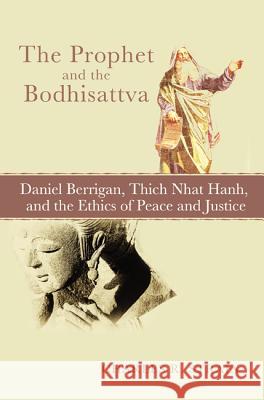The Prophet and the Bodhisattva: Daniel Berrigan, Thich Nhat Hanh, and the Ethics of Peace and Justice » książka
The Prophet and the Bodhisattva: Daniel Berrigan, Thich Nhat Hanh, and the Ethics of Peace and Justice
ISBN-13: 9781620328415 / Angielski / Miękka / 2014 / 290 str.
The Prophet and the Bodhisattva: Daniel Berrigan, Thich Nhat Hanh, and the Ethics of Peace and Justice
ISBN-13: 9781620328415 / Angielski / Miękka / 2014 / 290 str.
(netto: 134,68 VAT: 5%)
Najniższa cena z 30 dni: 140,25
ok. 16-18 dni roboczych.
Darmowa dostawa!
Description: Can religious individuals and communities learn from each other in ways that will lead them to collaborate in addressing the great ethical challenges of our time, including climate change and endless warfare? This is the central question underlying The Prophet and the Bodhisattva. It juxtaposes two figures emblematic of an ideal moral life: the prophet as it evolved in ancient Israel and the bodhisattva as it flowered in Mahayana Buddhism. In particular, The Prophet and the Bodhisattva focuses on Daniel Berrigan and Thich Nhat Hanh, who in their lives embody and in their writings reflect upon their respective moral type. Berrigan, a Jesuit priest, pacifist, and poet, is best known for burning draft files in 1968 and for hammering and pouring blood on a nuclear warhead in 1980. His extensive writings on the Hebrew prophets reflect his life of nonviolent activism. Thich Nhat Hanh, Buddhist monk, Vietnamese exile, and poet struggled to end the conflict during the Vietnam War. Since then he has led the global movement that he named Engaged Buddhism and has written many commentaries on Mahayana scriptures. For fifty years both have been teaching us how to pursue peace and justice, a legacy we can draw upon to build a social ethics for our time.
Description:Can religious individuals and communities learn from each other in ways that will lead them to collaborate in addressing the great ethical challenges of our time, including climate change and endless warfare? This is the central question underlying The Prophet and the Bodhisattva. It juxtaposes two figures emblematic of an ideal moral life: the prophet as it evolved in ancient Israel and the bodhisattva as it flowered in Mahayana Buddhism. In particular, The Prophet and the Bodhisattva focuses on Daniel Berrigan and Thich Nhat Hanh, who in their lives embody and in their writings reflect upon their respective moral type. Berrigan, a Jesuit priest, pacifist, and poet, is best known for burning draft files in 1968 and for hammering and pouring blood on a nuclear warhead in 1980. His extensive writings on the Hebrew prophets reflect his life of nonviolent activism. Thich Nhat Hanh, Buddhist monk, Vietnamese exile, and poet struggled to end the conflict during the Vietnam War. Since then he has led the global movement that he named Engaged Buddhism and has written many commentaries on Mahayana scriptures. For fifty years both have been teaching us how to pursue peace and justice, a legacy we can draw upon to build a social ethics for our time.











